The Great Career Reset: The Positive and Negative Impact of COVID-19
The negative effects of the COVID-19 pandemic on work and careers have been widespread and well-documented. Millions of professionals have seen their salaries slashed and many have lost their livelihoods entirely, with nearly 4 million jobs already vanishing for good in the United States alone.1
And yet, it would be inaccurate to say that the global response to the pandemic has been altogether detrimental to the working professional. As part of our career outlook research, GetSmarter, a 2U, Inc. brand, asked 648 past students around the globe how COVID-19 has negatively or positively impacted their careers. Surprisingly, less than a third of respondents believe that the pandemic has negatively affected their careers, with 42% feeling neutral and 27% citing a positive or very positive impact. A deeper dive into the varying emotions that surround work in a time of a pandemic can be found in the first post of this series: The Great Career Reset: Why Some Thrive While Others Barely Survive.
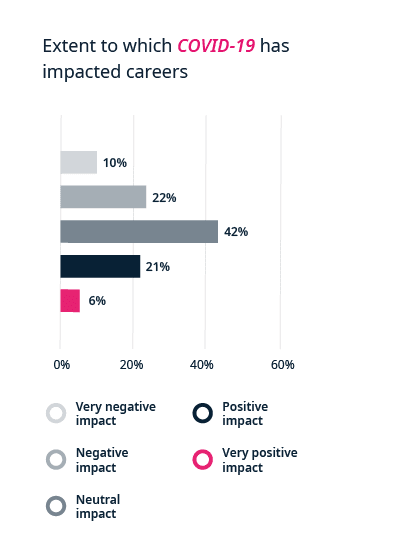
To better unpack this sentiment, GetSmarter analyzed respondents’ open-ended replies to the question of COVID’s negative and positive impact, applying a framework of:
- Control: a situation that personally affects me, and I can control my reaction to it
- Influence: a situation that personally affects me, but I can’t influence it
- Concern: I’m aware of the situation but it may not affect me personally and I can’t influence it
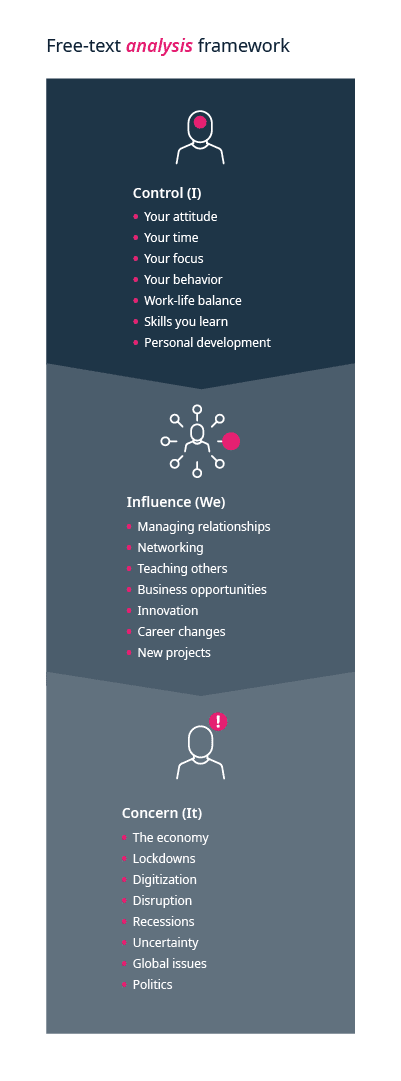
The negative impact of COVID-19 on careers
For many, COVID-19 has had a clearly negative impact on both the aspects of work within their control (for instance, the decline in meaningful day-to-day interactions) and those beyond (such as market instability or a potential double-dip recession). However, according to GetSmarter’s research, the biggest detrimental impact by far has been felt in the sphere of “Influence” – where 75% of respondents have been personally affected by the pandemic but still feel powerless to change things. This hints at a newfound sense of global uncertainty, as professionals are placed under increasing pressure to adapt and foster resilience in order to thrive.
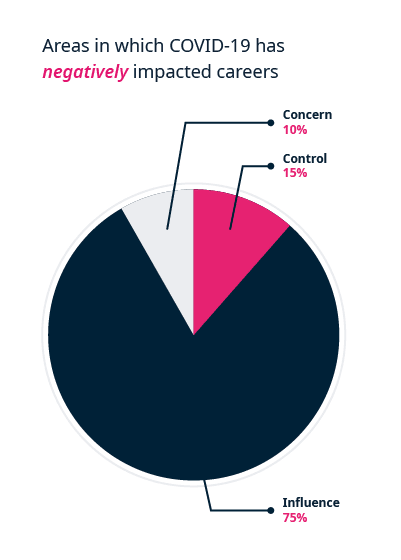
A lack of balance and loss of influence
Many respondents express anxiety over working more and for longer hours during the pandemic, suggesting that they have struggled to staunch the bleed of work responsibilities into personal time. Other studies support this, showing that locked-down employees work for 48.5 minutes longer every day, and participate in more meetings.2 GetSmarter’s research found that time is a more valuable commodity than ever, especially among millennials (who worry that their increased workload obstructs their capacity to take on new projects), and Generation X – particularly parents – who feel that they must work longer hours to maintain some level of job security. Across generations, burnout is also an abiding theme, as is a sense that plans have been postponed and career growth stalled.
The pandemic has also landed a substantial body blow to many of the methods traditionally used to exert influence in business. Those respondents who remain employed express anxiety over how a loss of mobility and valuable networking opportunities has slowed their cash flow and delayed important plans. Further studies suggest that more than two-thirds of executives have experienced moderate to considerable challenges in customer acquisition during the lockdown.3 And with nine in 10 people living in countries that have had some form of travel restriction,4 many have found their business opportunities curtailed and spheres of influence shrunk.
A number of industries had a particularly difficult year in 2020, with shareholder returns markedly declining in sectors such as oil and gas (by 16.9%), commercial aerospace and travel (9.7% and 2.4% respectively), banks and insurance (7.5% and 4%), telecoms (8.8%), and real estate (9.4%).5 Unsurprisingly, GetSmarter’s research revealed substantial increases in distress levels from respondents in these sectors, with those in energy, oil, or transport 23% more distressed than they were 12 months ago, and professionals in banking and finance or media, marketing, or communications 13% more distressed than they were in 2019.
Our research also reflects a sense of disconnection from the workplace – particularly among baby boomers whose recent isolation has, in some cases, pushed them into early retirement. Further reports suggest that nearly half of today’s newly remote workers worry that their sense of belonging suffers at home,6 and three-quarters of the American workforce feel less connected.7
The positive impact of COVID-19 on careers
At the same time, however, many have felt that COVID-19 has had a positive impact on their careers. Our positive responses reveal some degree of ambivalence towards the question of influence as, while some respondents have felt restricted, more than half (51%) have simultaneously found new clarity in this regard. By claiming ownership over their skills development and embracing remote work, respondents have also been able to take more control (38%) of their careers and professional growth.
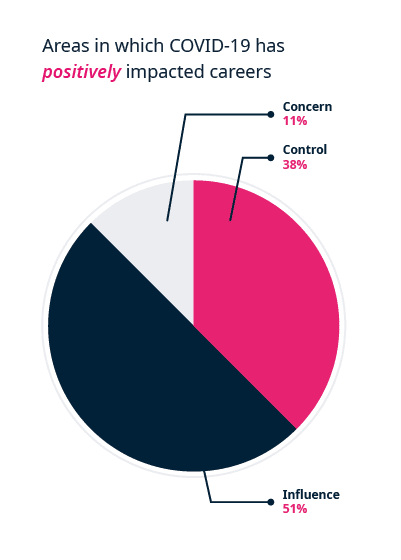
Influencing the future of work
For many, the ‘new normal’ has enabled organizations to pinpoint growth opportunities and advance digitization. According to our research, both Generation Z and millennials express excitement at how leading companies have placed greater emphasis on advancing cutting-edge technologies and fostering digital collaboration. Globally, executives have found that the crisis has created significant opportunities for their organizations, with 77% agreeing that it has accelerated their digital transformation efforts.8 In thriving industries such as IT and tech (where shareholder returns have increased by 53.5%), advanced electronics (41.7%), healthcare supplies (32.7%), medical technology (25.1%), and pharmaceuticals (19%),9 respondents are invigorated to pursue new opportunities – with GetSmarter’s research indicating that individuals in healthcare or biotech 17% more energized than a year ago. Many respondents also express satisfaction that the lockdown has allowed them to better illustrate their impact from the safety of their homes. The fact that some 75% of employees have been able to maintain or improve their productivity remotely appears to have fostered an enhanced level of support from their organizations.10
Taking back control
The slowdown effect of the lockdown has afforded respondents greater control over how they allocate their time, with many grateful for the opportunity to reevaluate their priorities. Millennials, Generation X, and baby boomers have all appreciated the opportunity to reconnect with what’s important to them, with parents particularly grateful to have more flexible hours at their disposal. Nearly half of newly remote workers say they now spend the time usually needed for commuting with their families,11 with a substantial 86% of workers expressing satisfaction with their new work-life balance.12
Harnessing COVID-19’s positive effects in future career paths
According to GetSmarter’s 2020 ‘The Future of Work Is Here’ report, the one thing that employers value above all else on an applicant’s CV is evidence of continued learning.13 Today, in a time of disruption, there’s a burgeoning desire to meet this need as respondents seek to enhance their skill sets and advance their careers, regardless of geographics and demographics. GetSmarter’s research suggests that millennials (especially those who aren’t parents) have used the time to seriously contemplate a career change, or focus on pursuing their studies. Over half of tertiary-educated young people globally have already pursued new training courses during the pandemic,14 and women particularly anticipate that new professional opportunities will emerge for them in the longer term.15
By developing a tool kit of transferable skills, professionals can bolster their ability to pivot into new roles, regardless of whether their industry is currently thriving or not. A look at the top trending competencies towards the end of 2020 reveals that broadly relevant skills such as teaching, writing, team building, and project delivery – those detached from any single sector or job title – are increasingly prioritized in leading economies:16
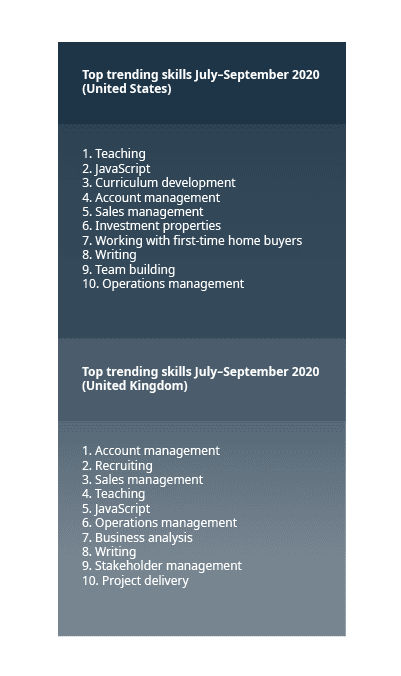
A combined arsenal of both technical and soft skills can empower today’s professionals – not only to prosper in their current positions, but to build sustainable careers that are resilient to the most drastic changes. Ultimately, it appears that we stand on the cusp of a new era of upskilling and personal development, where the majority of learning and development professionals see a stronger appetite for learning than before COVID-19 took hold.17
Regardless of whether the pandemic has had a predominantly negative or positive impact on your career, now is the time to prepare for an uncertain future. Whether your career trajectory has been turned upside down and you want to upskill to remain relevant, or you feel more in control and want to leverage this opportunity for growth, the GetSmarter Career Navigator tool provides the insights to help you take charge of your career. Explore how best to go about building your professional skill set and develop a better understanding of your individual worth, using an intuitive dashboard and salary calculator.
Discover growth opportunities using the Career Navigator tool.
Stay competent, confident, and informed
Sign up to our monthly newsletter to receive the latest course information, expertise from renowned thought leaders, and a summary of our most recent blog articles.
- 1 Egan, M. (Oct, 2020). ‘Nearly 4 million US jobs have vanished forever’. Retrieved from CNN.
- 2 Kost, D. (Sep, 2020). ‘You’re Right! You Are Working Longer and Attending More Meetings’. Retrieved from Harvard Business School.
- 3 Moeser, M. (Aug, 2020). ‘How COVID-19 cratered financial services customer acquisition, profitability’. Retrieved from Digital Insurance.
- 4 Connor, P. (Apr, 2020). ‘More than nine-in-10 people worldwide live in countries with travel restrictions amid COVID-19’. Retrieved from Pew Research Center.
- 5 (Jan, 2021). ‘Market valuation of sectors in 2020’. Retrieved from McKinsey. Accessed 07 January 2021.
- 6 (Apr, 2020). ‘Report: Remote work in the age of COVID-19. Retrieved from Slack.
- 7 (Apr, 2020). ‘Over 90% of young workers having difficulty working from home, survey finds’. Retrieved from Business Wire.
- 8 Blau, A. and Lubetsky, L. (Nd). ‘CEOs share their perspectives on COVID-19 business outlook’. Retrieved from Deloitte. Accessed 05 November 2020.
- 9 (Jan, 2021). ‘Market valuation of sectors in 2020’. Retrieved from McKinsey. Accessed 07 January 2021.
- 10 Dahik, A. et al. (Aug, 2020). ‘What 12,000 employees have to say about the future of remote work’. Retrieved from BCG.
- 11 Burke, J. (Apr, 2020). ‘As working from home becomes more widespread, many say they don’t want to go back’. Retrieved from CNBC.
- 12 Collins, K. (Sep, 2020). ‘How the pandemic reset workers’ concept of work-life balance’. Retrieved from Fast Company.
- 13 (Sep, 2020). ‘The Future of Work is Here’. Retrieved from GetSmarter.
- 14 (2020). ‘Youth and COVID-19: Impacts on jobs, education, rights, and mental well-being’. Retrieved from the International Labor Organization.
- 15 Wiest, B. (Sep, 2020). ‘61% of women are planning a major career change post-pandemic, new survey shows’. Retrieved from Forbes.
- 16 (2020). ‘Insight into a rapidly changing economy’. Retrieved from LinkedIn.
- 17 (2020). ‘Leading with learning: Insights and advice about the new state of L&D’. Retrieved from LinkedIn Learning.